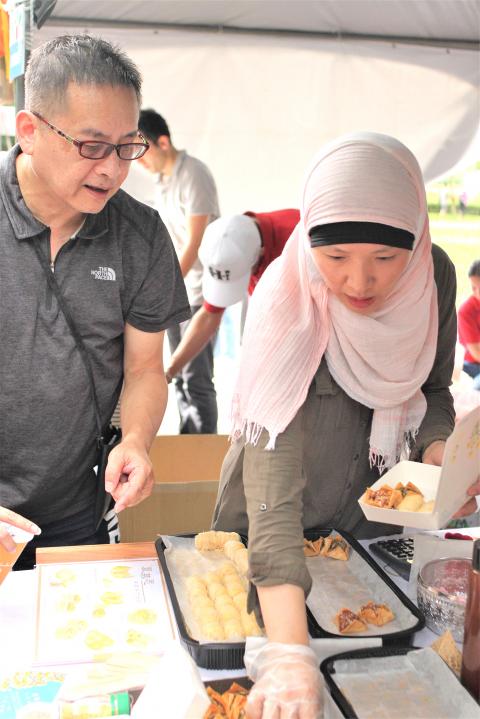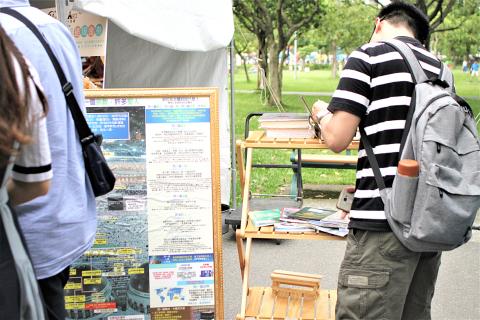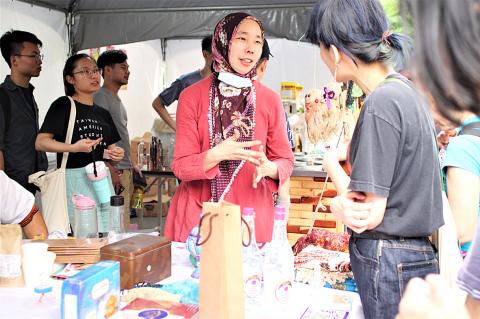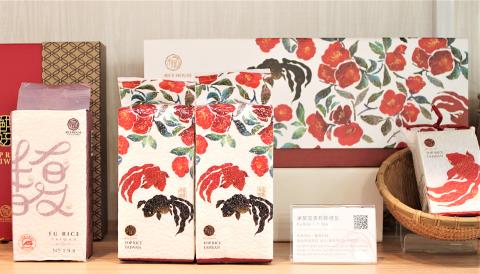Before halal certification, the only foods that a Muslim in Taiwan could confidently eat were fruits with peels, and eggs cooked in the shell.
The natural outer coverings ensure that even if these foods are stored next to non-halal products, they remain uncontaminated, says Salahuding Ma (馬超彥), secretary-general of the Chinese Muslim Association (CMA).
Things have come a long way since then.

Photo: Davina Tham, Taipei Times
This year’s Halal Taiwan pavilion — part of a massive international food expo (www.foodtaipei.com.tw) at the Taipei World Trade Center that ends today — consists of over a hundred booths showcasing food, beverage and wellness products made here in accordance with Islamic law.
Most stallholders say that they sought halal certification in order to export to the Southeast Asian market. Even if a product already appears vegetarian (such as peanuts and bubble tea pearls), the certificate is a way of assuring Muslim customers of its integrity.
“Halal certification signifies hygiene and cleanliness. In the international market, this boosts the effectiveness of our marketing,” says Chen Chiao-an (陳喬安), manager at Rice House, which sells gourmet Taiwanese rice.

Photo: Davina Tham, Taipei Times
Since starting its certification program in 2012, CMA has become the largest halal certification body in Taiwan. And Ma is hard-nosed about the business incentive that drives companies’ interest.
He considers market logic a practical way to strengthen understanding of Islam in a country where the local Muslim minority — numbering just 20,000 to 40,000 — is shrinking and still experiences friction with the wider population.
“We are isolated from the outside world. So we have to open the doors,” Ma says.

Photo: Davina Tham, Taipei Times
In order to receive the certification, staff must be trained in the requirements and religious significance of halal principles. Businesses pay NT$6,000 for this training and NT$500 for certification. But the main investments are in maintaining separate, uncontaminated food preparation space and equipment, and keeping trained staff on the payroll.
While Rice House’s certification went smoothly because rice is sold close to its natural state, processed foods face a more complicated inspection that requires more effort to pass.
In other words, halal certification is a commitment of time and money. CMA has no illusions that non-Muslim-owned businesses will only do it if they can sense the pay-off.

Photo: Davina Tham, Taipei Times
Within Taiwan, that pay-off takes the form of tourism. The association has released a mobile app in English, Malay and Indonesian, making it more convenient for tourists to locate the approximately 180 halal restaurants and hotels it has certified around the country.
CMA also conducts religious sensitivity training for tour agencies. In practice, this can mean leaving famous Taoist temples out of a tour itinerary; finding female physicians to treat female tourists; and, in an emergency, meeting the requirements of a Muslim burial within 24 hours.
Their efforts appear to be paying off. This year, Taiwan rose two spots to rank third (joint with Japan and the UK) on the Global Muslim Travel Index of Muslim-friendly countries outside the Organization for Islamic Cooperation, compiled by a Singapore-based consultancy.
But what does all this mean for the average Taiwanese, who is statistically unlikely to be Muslim?
On a recent Sunday, Taipei’s Daan Forest Park crawled with festival-goers celebrating the end of Ramadan, the Muslim month of fasting. Human traffic was high along a row of stalls offering halal Taiwanese-style fried chicken, Indian biryani and Turkish rice pudding.
The event naturally attracted Muslim foreign workers longing for a taste of home and community.
A sea of female domestic helpers, enjoying a rare day off, fawned over a baby-faced Indonesian pop star crooning live ballads on-stage.
But locals also turned out in significant numbers, many having planned their visits after learning about the festival from advertisements running on the Taipei metro system. Most did not personally know any Muslims, but came because they wanted to soak in the atmosphere of another culture.
As a result, Muslim entrepreneurs who ordinarily run niche businesses from home had a field day. Dainty baklava from Shams’s Halal Handmade sold out a few hours before the market ended, while inquisitive aunties clustered around bottles of rose water imported from Iran by Iwan Shop.
Visitors do not understand more about Islam just by eating a bowl of halal lamb noodles. And while queues for food stalls ran long, the same could not be said for the booths of the Grand Taipei Mosque and CMA, nor a small standalone bookshelf holding Islamic tracts.
But for the globally-minded, the curious and those who just happened to be in the park that day, the festival was an energizing, albeit finite, display of Taiwan’s embrace of diversity. Interactions with Muslim stallholders alone helped locals put human faces to an often invisible minority.
Ma insists that halal certification and Muslim community events are merely an extension of Taiwan’s existing reputation for friendliness and open-mindedness.
“What we’re doing is just to manifest our friendliness when it comes to the needs [of Muslims],” he says.

The canonical shot of an East Asian city is a night skyline studded with towering apartment and office buildings, bright with neon and plastic signage, a landscape of energy and modernity. Another classic image is the same city seen from above, in which identical apartment towers march across the city, spilling out over nearby geography, like stylized soldiers colonizing new territory in a board game. Densely populated dynamic conurbations of money, technological innovation and convenience, it is hard to see the cities of East Asia as what they truly are: necropolises. Why is this? The East Asian development model, with

June 16 to June 22 The following flyer appeared on the streets of Hsinchu on June 12, 1895: “Taipei has already fallen to the Japanese barbarians, who have brought great misery to our land and people. We heard that the Japanese occupiers will tax our gardens, our houses, our bodies, and even our chickens, dogs, cows and pigs. They wear their hair wild, carve their teeth, tattoo their foreheads, wear strange clothes and speak a strange language. How can we be ruled by such people?” Posted by civilian militia leader Wu Tang-hsing (吳湯興), it was a call to arms to retake

This is a deeply unsettling period in Taiwan. Uncertainties are everywhere while everyone waits for a small army of other shoes to drop on nearly every front. During challenging times, interesting political changes can happen, yet all three major political parties are beset with scandals, strife and self-inflicted wounds. As the ruling party, the Democratic Progressive Party (DPP) is held accountable for not only the challenges to the party, but also the nation. Taiwan is geopolitically and economically under threat. Domestically, the administration is under siege by the opposition-controlled legislature and growing discontent with what opponents characterize as arrogant, autocratic

Desperate dads meet in car parks to exchange packets; exhausted parents slip it into their kids’ drinks; families wait months for prescriptions buy it “off label.” But is it worth the risk? “The first time I gave him a gummy, I thought, ‘Oh my God, have I killed him?’ He just passed out in front of the TV. That never happens.” Jen remembers giving her son, David, six, melatonin to help him sleep. She got them from a friend, a pediatrician who gave them to her own child. “It was sort of hilarious. She had half a tub of gummies,